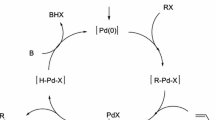Summary
-
1.
A number of catalysts have been investigated in the phenol—isobutene alkylation reaction under comparable conditions, these catalysts including BF3, H3PO4· BF3, AlCl3, H2SO4, and AlCl2 · HSO4; it was shown that boron fluoride, taken in 0.8–1% quantity, is the most active catalyst and gives the highest yield of p-tert-butylphenol.
-
2.
An investigation has been made of the effect of various factors on alkylate yield and composition in phenol isobutene alkylation with boron fluoride. The yield of p-tert-butylphenol reaches 78–88% of the theoretical.
Similar content being viewed by others
Literature cited
Beilsteins Handbuch der Organischen Chemie 1923, 6, 576.
R. Pardee and V. Weinrich, Industr. and Chem.36, 596 (1944).
D. R. Stevens, J. Organ. Chem.20, 1233 (1955).
Author information
Authors and Affiliations
Rights and permissions
About this article
Cite this article
Topchiev, A.V., Kurashev, M.V. & Paushkin, Y.M. Effectiveness of various catalysts in alkylating phenol with isobutene. Russ Chem Bull 10, 282–285 (1961). https://doi.org/10.1007/BF00919567
Received:
Issue Date:
DOI: https://doi.org/10.1007/BF00919567



